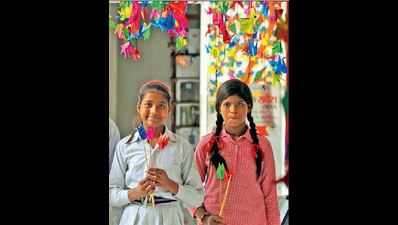- News
- City News
- delhi News
- Paper cranes to fulfil Japan girl’s dying wish
Trending
This story is from August 7, 2016
Paper cranes to fulfil Japan girl’s dying wish

Girls from the Sansi, Perna and Sapera communities of Dharampura, Najafgarh, made 1,000 paper cranes on Hiroshima Day.
NEW DELHI: On Hiroshima Day on Saturday, Sneha and her friends came to Press Club of India with over a thousand brightly coloured paper cranes made by over 200 girls. The girls from the Sansi, Perna and Sapera communities of Dharampura, Najafgarh, were continuing the legend of Sadako Sasaki of Hiroshima, who wanted to fold 1,000 origami cranes, believing that doing so would grant her a wish.
The Japanese girl died before she could get that wish fulfilled, succumbing to blood cancer, the result of radiation after the bombing of her city. But the 1,000 paper cranes from Najafgarh came with its own wish: ‘Peace for children all over the world’.
Sneha, a Class VIII student, and her mates lit candles and sang songs against female foeticide in their tribal dialect at the symbolic ceremony organised by NGOs Aseem Asha Foundation and apneaap. “Sadako Sasaki could make only 650 birds before she died,” said Sneha, who belongs to the denotified Sapera tribe and goes by a single name. “After her death, her friends made cranes to take the number to 1,000. In solidarity, we have also done the same.”
The festoon of multi-hued paper cranes will remain on display at the Press Club till August 9, which commemorates the beginning of the Quit India movement.
The participating girls belong to tribes that were originally classified as ‘criminal’ by the colonial administration. “Even after being denotified, the tribes continue to face discrimination,” said Taw Nana of apneaap, citing the tweet of Kiran Bedi after the rape in Bulandshahar. Pondicherry lieutenant governor Bedi had tweeted: “Ex-criminal tribes are known to be very cruel. They are hardcore professionals in committing crimes. Rarely caught and/or convicted.”
This continuing social prejudice hurts. “If educated leaders say we are born criminals, what happened to the struggle of Gandhi and Nehru to free India from the British and their laws? We are still not free of bias,” rued 10-year-old Prachi, a Sapera tribal.
The Japanese girl died before she could get that wish fulfilled, succumbing to blood cancer, the result of radiation after the bombing of her city. But the 1,000 paper cranes from Najafgarh came with its own wish: ‘Peace for children all over the world’.
Sneha, a Class VIII student, and her mates lit candles and sang songs against female foeticide in their tribal dialect at the symbolic ceremony organised by NGOs Aseem Asha Foundation and apneaap. “Sadako Sasaki could make only 650 birds before she died,” said Sneha, who belongs to the denotified Sapera tribe and goes by a single name. “After her death, her friends made cranes to take the number to 1,000. In solidarity, we have also done the same.”
The festoon of multi-hued paper cranes will remain on display at the Press Club till August 9, which commemorates the beginning of the Quit India movement.
Aseem Asha Usman, director of Aseem Asha said that though Hiroshima and Nagasaki had passed on, wars continue to bring suffering. “With craft as a medium, our children can make people aware about the pain that wars bring,” said Usman.
The participating girls belong to tribes that were originally classified as ‘criminal’ by the colonial administration. “Even after being denotified, the tribes continue to face discrimination,” said Taw Nana of apneaap, citing the tweet of Kiran Bedi after the rape in Bulandshahar. Pondicherry lieutenant governor Bedi had tweeted: “Ex-criminal tribes are known to be very cruel. They are hardcore professionals in committing crimes. Rarely caught and/or convicted.”
This continuing social prejudice hurts. “If educated leaders say we are born criminals, what happened to the struggle of Gandhi and Nehru to free India from the British and their laws? We are still not free of bias,” rued 10-year-old Prachi, a Sapera tribal.
End of Article
FOLLOW US ON SOCIAL MEDIA










